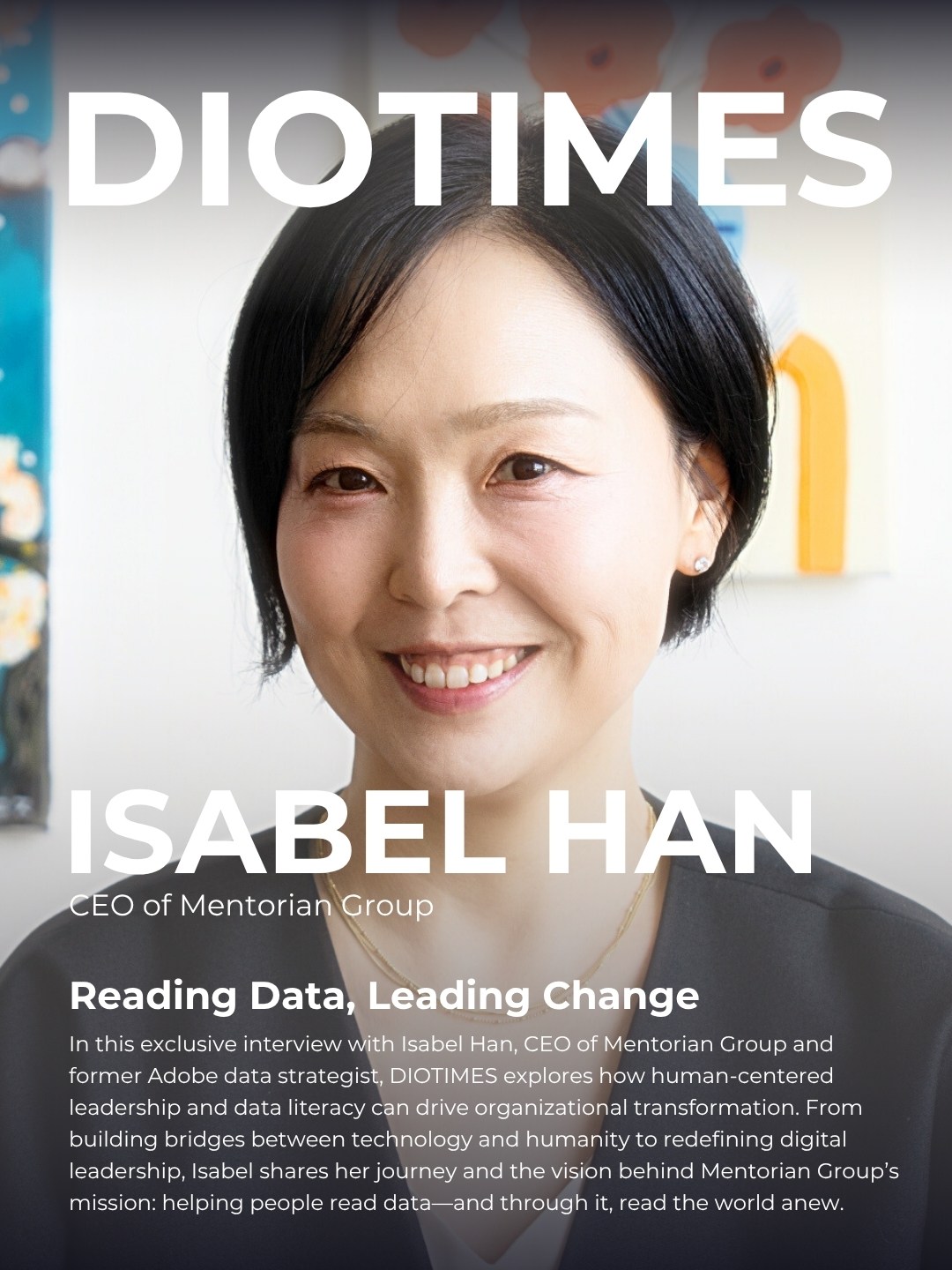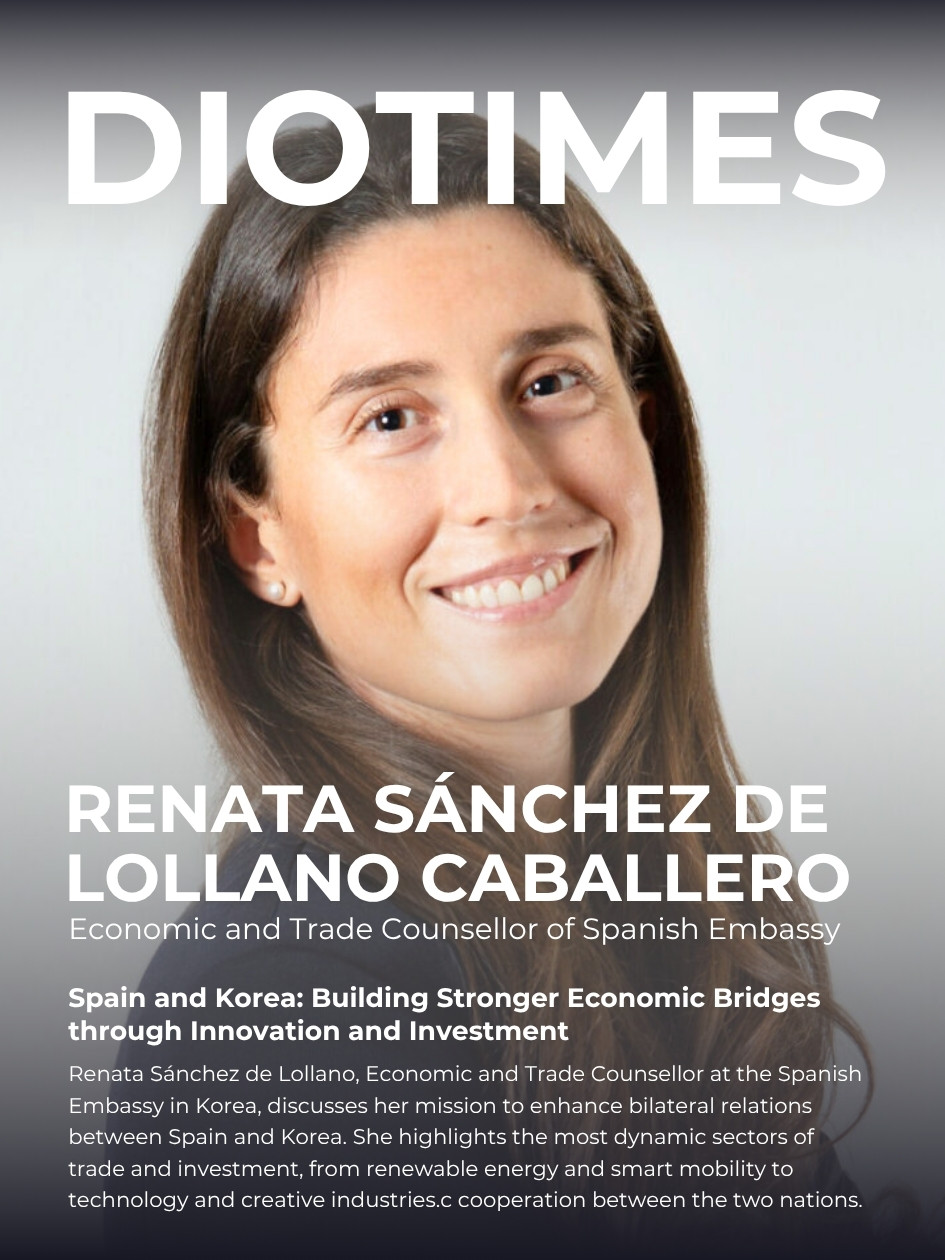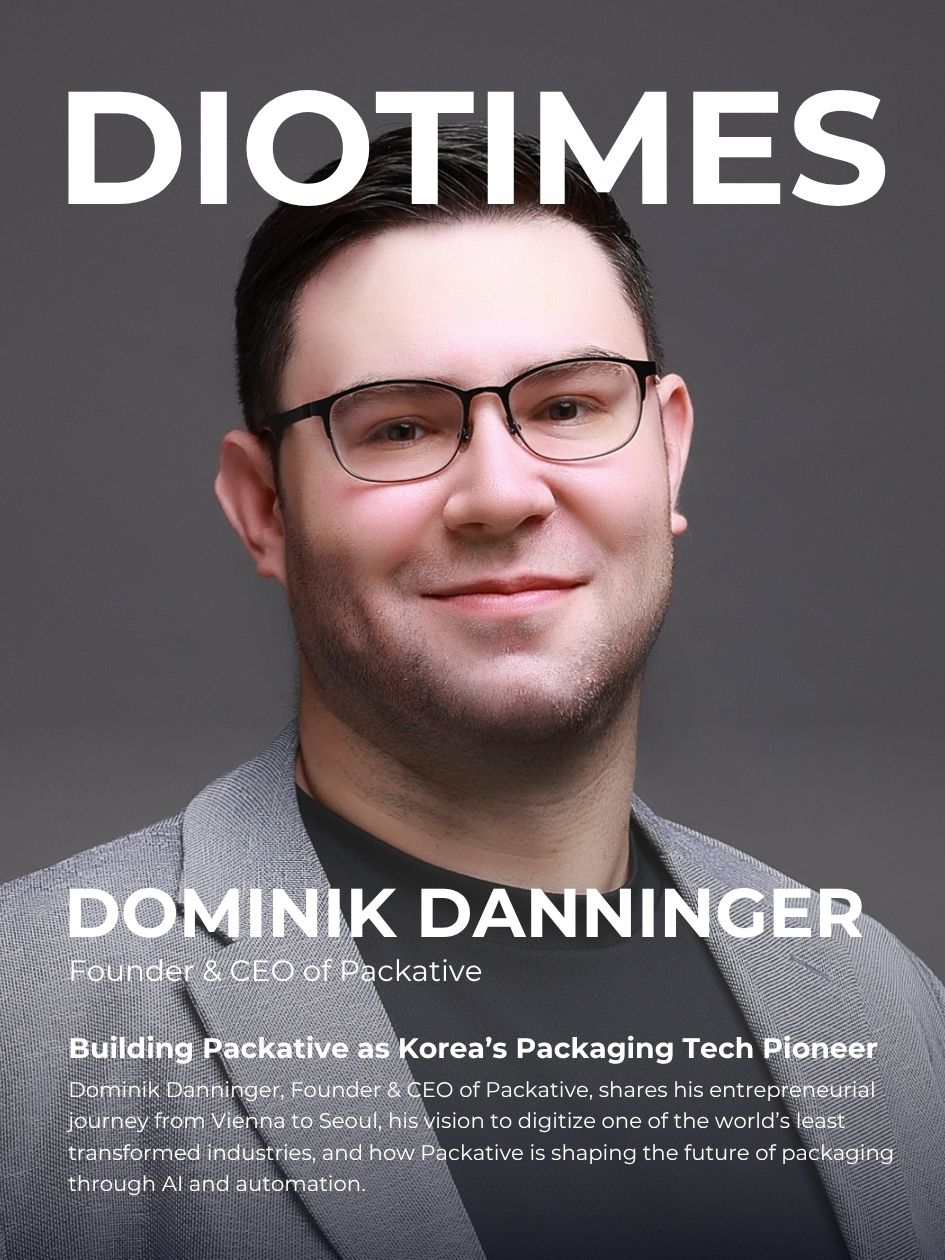In an era where AI and data are reshaping our world, many organizations grapple with how to leverage these technologies. But perhaps the more fundamental question is: Can we truly understand this technology and use it in a human-centered way?
Isabel Han has spent years finding answers at the intersection of technology and humanity. Moving beyond her career leading global data strategies at Adobe and Monks, she now champions data literacy and human-centered leadership through Mentorian Group.
Her mission is clear:
“To help people read data, and through data, read the world anew.”
Her journey of building bridges—between non-technical and technical professionals, organizations and individuals, and AI and humanity—invites us to reconsider what “digital leadership” truly means.

Personal Journey & Leadership
What was the biggest turning point in your career?
The most decisive turning point in my career came in 2010 when I joined Adobe and was first introduced to the world of web analytics. What we now take for granted—analyzing user behavior on websites—was an eye-opening revelation for me at the time. Working with global clients across diverse countries beyond the Korean market, I gained invaluable experience consulting and training teams. Despite different cultures and business environments, we could communicate through the common language of “data” and drive results together. This period established data as a crucial asset in my career. The fact that I traveled abroad so much that my passport ran out of space for stamps was also an experience I couldn’t have gotten anywhere else. It was from this time that my exploration into how humans can understand and utilize data as a technical tool truly began.
How did your global experience influence your leadership in Korea?
Leading the Korea office at Monks (formerly Media.Monks) and integrating the Korean team as a core part of the global organization was the most intensive leadership experience of my career. The countless successes and failures I experienced collaborating with teams and clients from various countries during my nearly 10 years at Adobe became a tremendous asset. Thanks to this, I could significantly reduce the trial and error that comes from cultural differences and different work styles. I was able to serve as a “bridge,” balancing global standards with the uniqueness of the Korean market and strategically connecting how the Korean team’s strengths could best shine on the global stage. While not everything I tried was successful, these experiences have become a strong foundation for Mentorian Group to consider how we can help Korean companies strengthen their data-driven capabilities as they compete with or collaborate alongside global companies.
How do you define “human-centered leadership” in a technology-driven society?
Back in my Sun Microsystems days, I once asked a respected manager how to become a good leader. The answer was surprisingly simple: “Buy them meals often.” Reflecting on this over time, I think it meant more than just building rapport—it was about understanding the full context of each team member’s situation through those interactions.
So what is “human-centered leadership” in a technology-driven society? It’s not about being emotionally supportive or offering comforting words. If an organization is like a road trip toward a destination, technology and data are like the navigation system guiding the way. Human-centered leadership, then, is like being in the passenger seat while a team member drives. That’s how you can understand the context they’re in. When a novice driver embarks on a long journey, you help them watch the navigation together, and when unexpected problems arise, you help them respond calmly.
Ultimately, technology tells us where to go, but people decide how we get there together.
What was the most memorable experience you’ve had working with data and technology?
One project with a global manufacturing company particularly stands out. They had invested heavily in cutting-edge data platforms and technologies but were frustrated with not achieving the results they wanted. Management believed that simply consolidating data in one place would solve many of their concerns. However, as the project progressed, we discovered they were racing ahead without clearly defining “what for”—the purpose behind this massive initiative. Moreover, different parts of this large organization had vastly different perspectives on the project and desired outcomes, so no one could picture what success would look like.
The biggest insight from this experience was that many organizations miss the most obvious question: “What problem do we want to solve together?” before asking “What tools should we buy?” This simple principle—that technology is a means, not an end—remains my most important discovery.

The Birth & Philosophy of Mentorian Group
What led you to establish Mentorian Group?
I met many clients at Adobe and Monks. The reason many organizations couldn’t generate results despite having the best technology and data wasn’t the absence of technology. The real problem was twofold: a lack of business questions about “why we need to look at this data,” and broken communication because different departments interpreted data in different languages.
I founded Mentorian Group to address this gap. My belief is simple: we need to bridge the divide between technical experts and business leaders. We need to help organizations communicate in the language of data and solve problems together. And we need to enhance data and AI literacy so that technology can truly fulfill its role.
What are the core values that Mentorian pursues?
Mentorian Group pursues two core values: “Confidence through Curiosity” and “Data that Drives Dialogue.”
First, Confidence through Curiosity addresses “fear,” the biggest psychological barrier to data adoption. We start education not with complex theories, but with small curiosities related to participants’ own work. This is where my approach to data and AI literacy education for corporate clients begins.
Second, Data that Drives Dialogue is about breaking down organizational silos. In many organizations, data becomes a weapon for arguments rather than a tool for communication. Through data storytelling, we coach organizations on how to communicate effectively with data.
What types of organizations or individuals benefit most from Mentorian’s education?
There are two main groups. The first is leaders in organizations that want data-driven innovation but don’t know where to start. These are people who have invested heavily in technology adoption but aren’t seeing tangible results. The second is middle managers and practitioners who need to act as “translators” between data experts and business operations. For both groups, we provide the greatest value when they want to bridge the gap between technology and business and strengthen their ability to persuade with data.

Data Literacy & The Human Side of AI
Why do you see data literacy as important for companies and individuals today?
There was a time when making important decisions based on a leader’s experience and intuition—their “gut feeling”—was considered a virtue. But now the business environment has become so complex that it’s difficult to find optimal answers through individual experience alone.
We’ve entered an era where companies and individuals must question whether what they “believe they know” might not be true. The starting point for that verification is the signals that data shows. Understanding the meaning of these signals is no longer optional—it’s what separates those who can adapt and compete from those who cannot.
How do you feel human roles are changing in the AI era?
This is a very difficult question that no one can easily answer. As we already know, AI has surpassed humans in “finding answers.” I agree with what many have already mentioned—that in the AI era, humans take on the role of “asking questions.” But I think we now need to consider specifically what we should be asking questions about. This is because the right questions ultimately start from judgments about “what is right.”
In that sense, humans must evolve into the role of Arbiter of Values. AI pursues efficiency and optimization, but it cannot judge whether something is “the right thing to do.” Our role is to weigh the long-term values, ethics, and social responsibilities that numbers don’t capture. We must make the final judgment on whether what technology pursues aligns with human values. This is the evolution we must embrace.
Do you have any secrets for helping people who don’t understand technology to grasp data?
I believe the process of understanding data should be like “reading a mystery novel,” not a “math class.” Nobody wants to solve calculus problems, but everyone loves finding the culprit in an intriguing murder case, right? “Sales dropped sharply here. Who’s the suspect? Number 1, the suddenly changed ad copy? Number 2, a competitor’s new product launch?”
When you turn everyone into a detective like this, data becomes not scary numbers but the most intriguing clue to solving the case. Getting people who aren’t interested in numbers to immerse themselves in the story behind the data—this is the data education I aim for.
What do you think needs to change first to create a data-driven organizational culture?
To realize “Data that Drives Dialogue” in an organization, the first thing that needs to change, even before introducing technology or systems, is “the leader’s first question.”
In many organizations, data is used as a “report card” to find faults and assign blame. In this environment, no one wants to present honest data. Leaders need to ask “What can we learn from this data?” instead of “Whose fault is this?”
When psychological safety is secured—where failure is not blamed but treated as a learning opportunity—only then can an organization have honest conversations about data. What should be held accountable is not failure itself, but failing to learn from it and repeating the same mistakes.

Business Growth & Differentiation
How do you see Mentorian Group differentiated from similar educational companies?
The biggest difference stems from a fundamental difference in perspective on how we teach “data.” While most education focuses on “how to read numbers”—technical analysis or tool usage—we focus on “how to create logic that gets you what you want through data.” We apply this philosophy to two groups: practitioners and leaders.
For practitioners, we teach them how to become “data storytellers.” Simply reporting “sales dropped by 20%” after looking at a chart is only half of data analysis. Our goal is to help them create their data story that can persuade their audience—whether executives, clients, or colleagues. We focus on communication skills that establish clear logic based on data and move people to action, such as “Sales declined due to reason A, so if we try solution B, we can achieve result C.” The outcome of this journey is clear: going beyond reading data to communicating effectively with it and ultimately achieving goals.
For executives, we help them shift from “answering with data” to “asking questions with data.” The data literacy leaders need isn’t coding or understanding complex statistical models. Rather, the key is knowing “what questions to ask” to understand whether our organization is heading in the right direction and what the real problems are that we need to solve.
We help leaders understand the essence of data and the structure of analysis so they can ask sharp questions that set the direction for business, rather than depending solely on technical or data teams. Mentorian Group is not a technical education company—it’s closer to a communication and leadership growth partner.
We change how organizations communicate through the language of data and build problem-solving capacity across the entire organization by enabling leaders to ask the right questions.
Do you have any memorable client cases or projects?
One public sector project particularly stands out. This organization trained technical personnel through IT software education. Despite having good programs, they were concerned about very low traffic to their digital channels, especially their website—their core channel. They were also skeptical about the performance of their external marketing campaigns.
The first thing we did wasn’t to present a grand strategy but to install an affordable and simple analytics tool on the website to collect data and observe user behavior as it actually occurred. We started tracking data on what paths users entered from, which pages they stayed on longest, and at what point they lost interest and left. Amazingly, within just one month, the core problems and improvement points became clearly visible.
We discovered that visitors were leaving the site before the information the institution wanted to emphasize was even exposed, and the site structure wasn’t aligned with mobile users’ journeys as much as they thought. Based on this data, we proposed site structure changes that matched users’ actual behavior to the executive in charge and successfully persuaded them.
But the bigger achievement was the change in the leader and team. After seeing the data, the leader started asking sharp questions like “What hypothesis should we test?” instead of vague directives like “increase visitors.” When the leader’s questions changed, the working team found a way to create change themselves through data and prove results.
This is exactly what we aim for—helping organizations understand data-driven decision-making and achieve tangible results quickly.
What is the future vision Mentorian Group has for the next 3–5 years?
The short-term goal for the next 3–5 years is to make data literacy mainstream in a broader market. I plan to focus on establishing data utilization capabilities not as the exclusive domain of specific departments or experts, but as basic competencies that all members of an organization should possess.
But the bigger picture—the long-term vision—is to move beyond being primarily a training company and become a hub for data-driven culture consulting.
I don’t want Mentorian Group to become a giant consulting firm that does everything directly. Instead, I want to create a mutually beneficial ecosystem of expert partners—skilled specialists in various fields who share our vision. I call them “Small Giants.”
These “Mentorians” (Mentor + ian) would connect people and organizations through the language of data. Together, we would create a platform where experts help each other grow while serving clients better. This collaborative ecosystem—where excellence thrives through partnership rather than scale—is the future of Mentorian Group that I envision.








